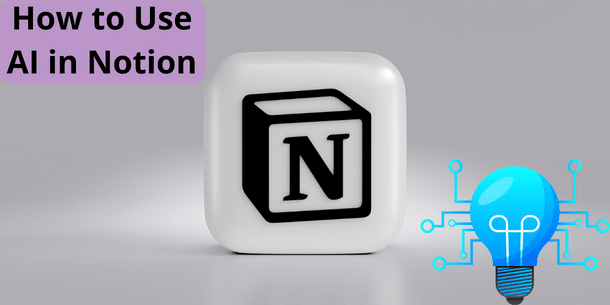There is no doubt that AI is on the rise, at least in the eyes of the common people. AI has, in fact, been a part of our lives in some form for a while now. More and more companies add AI to parts of their apps or platforms, and Notion is no exception.
But how does using AI in Notion work? When can it be useful and for what?
How to Use AI in Notion
Using AI in Notion is really simple, just press space and write a slash to use different commands for the AI. I personally use it by pressing space, then using the scrolling menu to decide what I want the AI to do.
Currently, the options offered are the following:
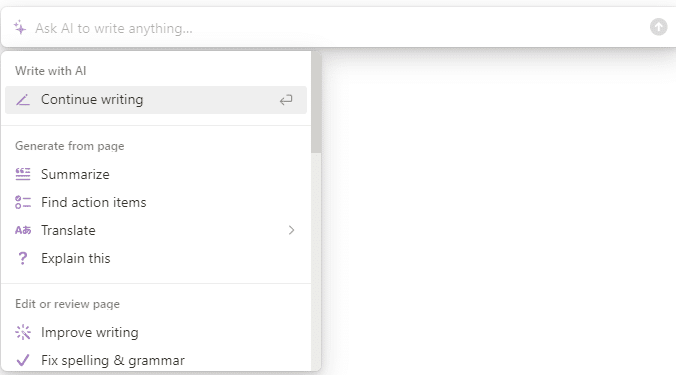
For writing, Notion also offers AI blocks of different kinds:
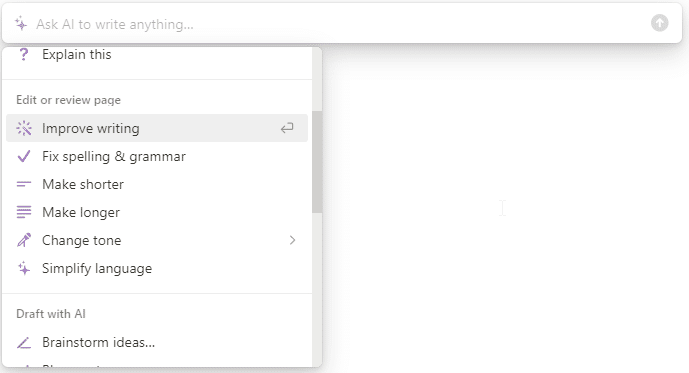
So far I’ve only tried out Outline and Blog post. There are quite a few more to try out.
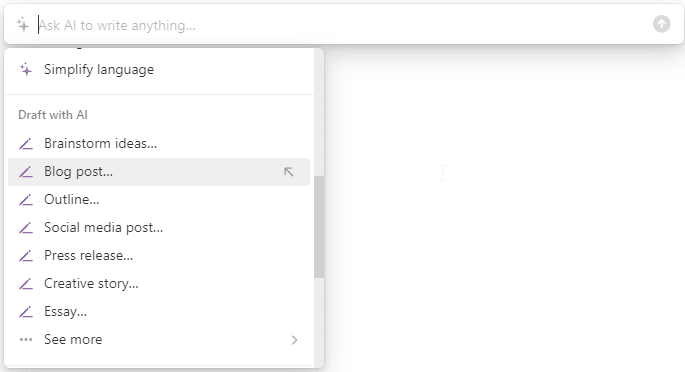
Benefits of Using AI in Notion
Since I use Notion as a place to write my drafts, the examples I have is relevant for writing. If you have an idea for a writing topic but don’t quite know how to structure your text, using AI can be useful. When asked to, the AI can give you a good outline. This in turn can help you as a starting point and is actually similar to what I usually do before starting my first draft.
The outline is returned to you as a bullet list, complete with sub-bullets for the different topics and parts of your text. It’s quick, which in turn lets you as a writer focus your energy to do the actual writing following the outline.
I also tried asking the AI to write a full blog post about a topic. It took a while longer, but it was still a very quick process. And the result? Well, I’ll include parts of it as an example below.
AI can be a huge time-saver, leaving all or parts of the creative work to human beings. There is another side to this of course.
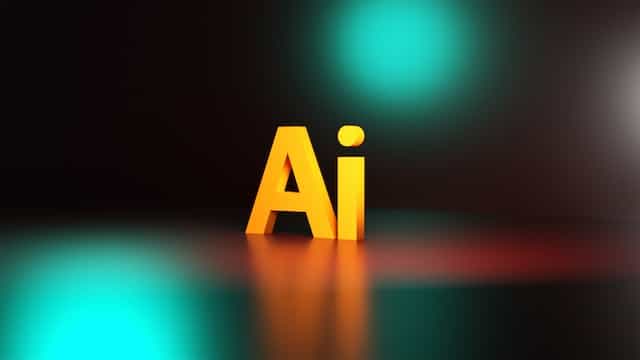
Drawbacks of Using AI in Notion
One thing that can be considered a drawback of using AI is this: who is the true creator of the text? It’s not so much a question of AI not being convenient, it is. But it provides an ethical dilemma that is both old and new. If a text or piece of art is generated by AI, it’s not really plagiarism. Then again, if you as a physical person present a piece of work that you used AI to create can you really take credit for this? Did you really create it?
Just like different automation has become a natural part of our everyday lives, AI will become a part of our lives in some way, shape, or form. The question is how soon and how integrated it will become. There is also a risk that if this becomes too big too quickly, we might not be able to go back and dial things back a bit.
In this, I agree with the tech people on this [LINK to Musk/others saying we need to proceed cautiously with AI). Just like the introduction of, and the way that social media has changed parts of our society, AI will do the same. And the problem is similar, it’s difficult to tell how this will affect the future.
As a tool on the free version of Notion, you get 20 free responses to use in your workspace. If this is a tool you really wish to use, then the free plan isn’t the way to go.
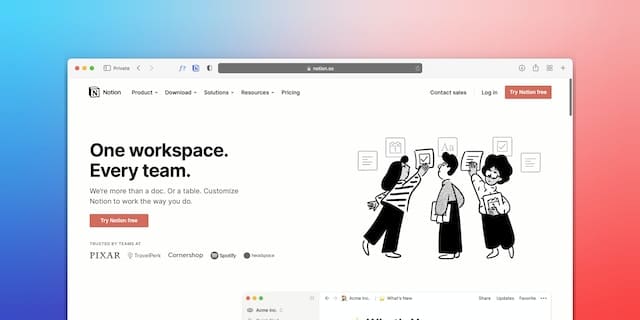
The Future of AI in Notion?
If I try to predict the future of AI in Notion, I definitely think it’s here to stay and will improve over time. As a user, you can give the AI feedback on things you ask it to do for you. This in turn will train the AI to do better in the future.
As a side note, I hope Notion may include more than twenty free responses in their free plan. This is of course just a wish, but I think it’s good to let new users try out as much of the current product before deciding to use a paid subscription.
Conclusion
Using AI as a helpful tool to get you started, or to broaden your ideas is one thing. To use AI-generated work as your own is quite another. As I mentioned in a previous post AI will, for sure, affect education in different ways. All of them aren’t necessarily bad, but I’m sure as educators we need to try the tools ourselves in order to teach our students to use them like that. Tools, not as the final product to hand in. Using AI in writing can be helpful. Imagine having a text and asking the AI to change the tone or summarize it. Seeing the way AI would deal with this, then comparing it to your original text could provide a useful learning experience.
The Ethics of Using AI
The problem as I see it is the ethical aspect of it all. Students need to understand that them putting in the effort makes them better writers overall. Asking an AI to work for them makes them better at giving AI instructions to suit their needs, but it won’t improve their own craft.
Using AI in an isolated application is one thing, but how do you know that what you do in that application stays there? What about if you use AI-driven search engines? Will these provide more accurate answers to your questions? Perhaps even suggest things you’ve been thinking of but never searched for? Are we getting closer to a Matrix-like society or that of older literature?
The last part of this piece is going to feel very meta. After all, since the option is there to ask AI to write a blog post – why not try it? I asked the AI in Notion to do the following:
- write an outline on the topic
- write a blog post about the topic
The reason was simple, I wanted to test it and see what the result would be. I have to say, I do see the potential. I also decided to leave my experiment here as an example of how AI can tackle a topic like this. Very meta indeed, have you tried using the AI in Notion yourself?
Meta: AI in Notion Writes a Post about AI in Notion
The text below this line is AI ONLY! First, you get the outline created, below that you’ll get the AI:s version of this article. What do you think about it? Is AI worth your time?

Using AI in Notion
- Introduction
- Explanation of the topic
- Brief overview of how AI is being used in Notion
- Benefits of using AI in Notion
- Improved accuracy in data analysis
- Enhanced productivity and automation
- Better organization and categorization of information
- Time-saving features
- Use cases of AI in Notion
- AI-powered search and tagging
- Automated data entry
- Smart task management
- Personalized content recommendations
- Potential drawbacks of using AI in Notion
- Security concerns
- Privacy issues
- Dependence on technology
- Future of AI in Notion
- Upcoming AI features
- Integration with other AI-powered tools
- Predictions for how AI will continue to shape Notion
- Conclusion
- Recap of benefits and drawbacks
- Final thoughts on the topic
Using AI in Notion
Introduction
Notion is a powerful productivity tool that allows users to create databases, notes, and to-do lists. Recently, there has been an increasing trend of integrating AI and machine learning into productivity tools to enhance the user experience. In this blog post, we will discuss the benefits, use cases, potential drawbacks, and the future of using AI in Notion.
Benefits of using AI in Notion
Notion is a versatile tool that can be used for various purposes. Integrating AI into Notion can bring several benefits, including:
Improved accuracy in data analysis
AI algorithms can analyze data more accurately and efficiently than humans, reducing the risk of errors and improving the quality of insights. With AI-powered data analysis, Notion users can get a better understanding of their data and make more informed decisions.
Enhanced productivity and automation
AI can automate repetitive and time-consuming tasks, allowing users to focus on more important work. Notion’s AI-powered automation can help users save time and increase productivity by automating data entry, reminders, and other routine tasks.
Better organization and categorization of information
Notion’s AI-powered features can help users better organize their information by automatically categorizing and tagging data. This can make it easier for users to find and access the information they need.
Time-saving features
AI-powered features in Notion, such as smart task management and personalized content recommendations, can save users time and improve their overall experience with the tool.
Use cases of AI in Notion
Notion’s AI-powered features can be used in various ways, including:
AI-powered search and tagging
Notion’s AI can help users find specific information by analyzing the content of their databases and notes. Additionally, AI-powered tagging can automatically categorize data based on its content, making it easier to organize and find.
Automated data entry
AI can automate the process of data entry by analyzing and categorizing data from different sources, such as emails and web pages. This can save users time and reduce the risk of errors.
Smart task management
Notion’s AI-powered task management can help users prioritize their tasks based on their importance and urgency. Additionally, AI-powered reminders can help users stay on top of their tasks and deadlines.
Personalized content recommendations
AI can analyze a user’s usage patterns and recommend relevant content to them. This can help users discover new features and tools within Notion that they may not have otherwise found.
Potential drawbacks of using AI in Notion
While using AI in Notion can bring numerous benefits, there are also potential drawbacks, including:
Security concerns
AI-powered features in Notion may require access to sensitive data, raising concerns about data security and privacy.
Privacy issues
AI can analyze a user’s data and usage patterns, raising concerns about data privacy and how this information may be used.
Dependence on technology
Over-reliance on AI-powered features in Notion may result in a loss of critical thinking and decision-making skills.
Future of AI in Notion
Notion is continually updating its features and capabilities, and AI is likely to play a significant role in these updates. Some possible future developments include:
Upcoming AI features
Notion is likely to continue to develop and integrate AI-powered features, such as advanced data analysis and natural language processing.
Integration with other AI-powered tools
Notion may integrate with other AI-powered tools, such as chatbots and virtual assistants, to provide users with a more comprehensive productivity experience.
Predictions for how AI will continue to shape Notion
AI is likely to continue to shape and improve the user experience in Notion, making it easier for users to organize their data, automate their tasks, and make more informed decisions.
Conclusion
In conclusion, using AI in Notion can bring numerous benefits, including improved accuracy in data analysis, enhanced productivity and automation, better organization and categorization of information, and time-saving features. However, there are also potential drawbacks, such as security concerns, privacy issues, and dependence on technology. As Notion continues to develop its features and capabilities, AI is likely to play an increasingly significant role in the tool’s future.
